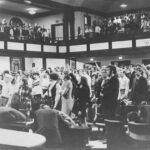Dec. 7, 1941 was one of the most influential days in the course of our nation’s history. The attack on Pearl Harbor, which led to our country’s entry into World War II, affected every person in the United States, and Asburians were no exception.
The most surprising aspect of this event in Asbury’s history is the fact that The Collegian made no mention of the attack on Pearl Harbor at the time but instead jumped directly into discussing the war. Pearl Harbor is 2,625 miles away from Asbury, so it wouldn’t seem as personal as the war itself, which permeated all aspects of every American’s life.
The first issue of The Collegian after the attack published on Dec. 13, 1941. One evidence of conflict the reader finds is an interview with President Dr. Z.T. Johnson, titled “Dr. Johnson Outlines Views of the War’s Effects Upon Asbury College and Ministerial Students.”
According to the article, the Collegian’s main question for President Johnson was “How will the war affect Asbury?” Dr. Johnson answered questions pertaining to how the war would affect the college, how Asbury’s boys would specifically be affected, the draft and how Asbury would participate in the war effort.
Although the college president’s thoughts on the war were very important, a more attention-grabbing article from the issue was “War From The Pulpit,” which addressed how people in ministry should deal with the international conflict.
The author started the piece by stating, “Within this past week, the prospective war that has hung over the heads of the American people for so long became an actual reality. There is little doubt that we have not fully comprehended what this means, but it can only come to us as the uncertain months ahead of us begin to unfold.”
America was starting to feel the effects of the war, and Asburians were beginning to process how the war would change things.
The contents of the rest of the issue looks very similar to what we have in our issue today — Christmas celebrations, preparing for finals, sports scores and opinions on campus dating culture. Overall, life at Asbury in December 1941 didn’t look much different from 2019, other than speculation on how the war would affect the lives of Asburians and ministerials.
The coming weeks followed this same pattern — The Collegian published articles they typically would, while occasionally acknowledging the war. The article with the most coverage of the war from that year was published on March 7.
“What is the place of Asbury College in a world at war?” the author Z.T. Johnson inquired. He describes the war torn world as a world “on fire” and suggests that “what a world on fire needs is the stabilizing influence of those men and women who live close to God.” Therefore, Johnson asserts that Asburians, as people who live close to God, have a duty to show God’s stable, constant love to people around the globe.
This is a message we still hear today. Not only was The Collegian of 1941 covering stories akin to those covered today, but the underlying messages still stand true today too. Asbury College in the midst of wartime 1941 was not that different from Asbury University in 2019.




